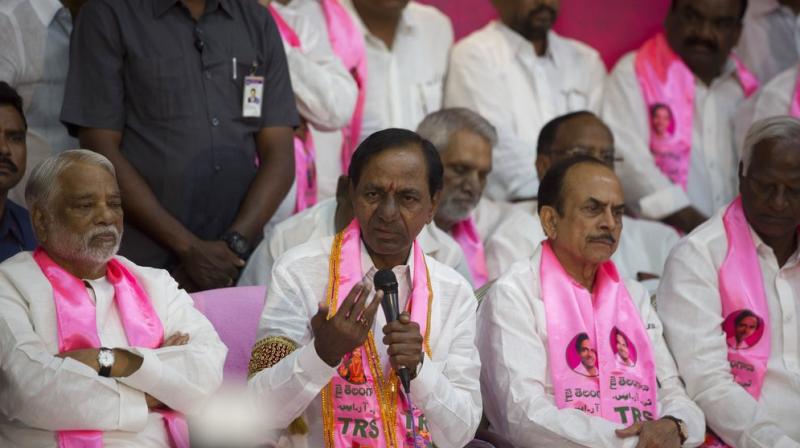It's TRS second term: Populist schemes pay handsome dividends to KCR
TRS secured a two thirds majority, winning 84 seats in 119 member assembly in resounding endorsement of KCR's popularity.

Hyderabad: A slew of populist schemes like ' Ryuthu Bandu' investment support scheme for farmers and social security pensions paid handsome dividends to TRS chief K Chandrasekhar Rao, who led his party to a thumping victory in Telangana.
The TRS secured a two thirds majority, winning 84 seats in the 119 member assembly in a resounding endorsement of KCR’s popularity.
Rao's focus on agriculture, rolling out the 'Ryuthu Bandu' investment support scheme for farmers that gave tillers Rs 8,000 per annum per acre and a Rs five lakh insurance cover for farmers consolidated his support base all over the state, especially in rural areas.
Ensuring 24 hour power supply for farmers and construction of double bedroom houses for the poor also proved a huge hit.
Rao is also credited with ensuring peace in Hyderabad, which had been rocked by communal violence in the past.
TRS leaders said the government's focus on development and welfare schemes led to the party's huge victory.
"This was expected because the people have accepted the (welfare) schemes (initiated by the Government)...the infrastructure that has been built....24-hour power supply and timely pensions...," TRS floor leader in the Lok Sabha, A P Jithender Reddy told PTI.
"The entire election was fought on Telangana sentiments again. He (KCR) made the election between him and Chandrababu Naidu", a TRS leader said, claiming that the Congress joining forces with TDP was "political suicide".
The TRS was also helped by AIMIM, which extended its support to the K Chandrasekhar Rao-led party in constituencies where the Asaduddin Owaisi-led outfit did not field candidates.
Owaisi had also campaigned for TRS candidates in some constituencies.
Rao's gamble of dissolving the Assembly in September, eight months ahead of schedule paid off handsomely in the polls.
"It was a master-stroke", said leaders cutting across party lines, on the decision to decouple the assembly election with that of the Lok Sabha polls next year.
"Congress vs BJP and Narendra Modi vs Rahul Gandhi" narrative would have dominated the poll scene, pushing state issues to the background in the event of simultaneous elections, a scenario KCR wanted to avoid.
"KCR was able to project this election also as if the future of Telangana was at stake", a leader of Congress, the principal challenger to the TRS in the state, said.
"He was able to play the sentiment card because of the 'unholy' alliance between the Congress and the TDP", he said.
During campaigning, KCR had repeatedly attacked TDP chief and Andhra Pradesh Chief Minister N Chandrababu Naidu, describing him as "anti-Telangana".
"A government where Chandrababu Naidu's writ runs large should not come (to power). A government of slaves to Delhi should not come. The plight of (people) going to Vijayawada (Andhra Pradesh capital) with applications should not come", Rao had said in his last election campaign in Gajwel.
While KCR announced 105 candidates on the day of the dissolution, allowing them to jump into campaign mode quickly, the Congress-led alliance that comprised the TDP, Telangana Jana Samiti and CPI took weeks to strike a seat-sharing deal.
The "undue delay" in its finalisation significantly cut down campaign time for the alliance, said leaders of the TJS and CPI.
While admitting MLAs from TDP and Congress, KCR expanded his base in segments where TRS had been traditionally weak.
"By defections, he was able to expand his area of influence", a TDP leader said.

